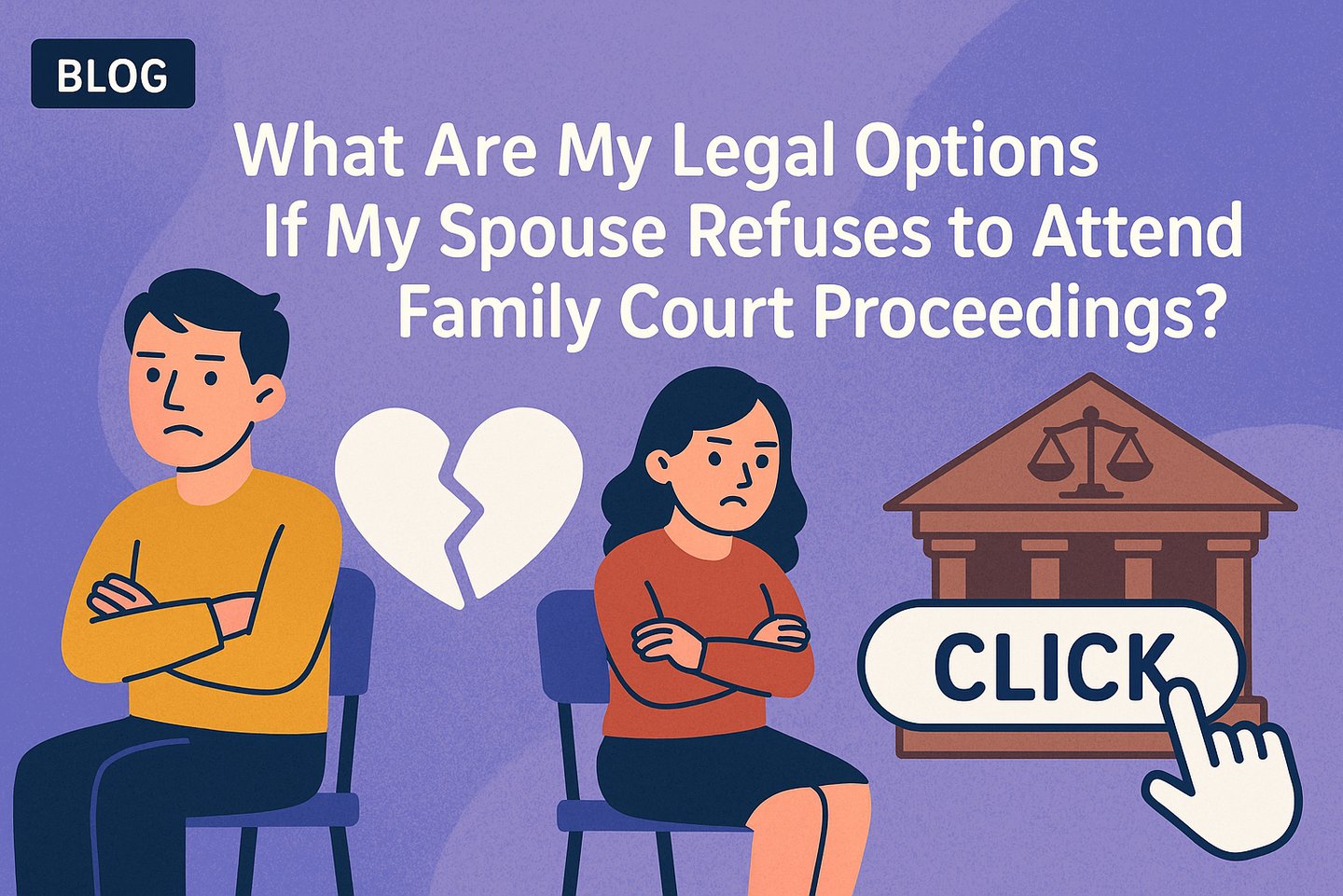What Are My Legal Options If My Spouse Refuses to Attend Family Court Proceedings?
This article explains legal remedies under Family Courts Act, CPC, and BNSS when one spouse fails to appear in matrimonial proceedings.
FAMILY LAW
Kaushiki agrawal
7/23/20253 min read


Disputes between family—especially legal proceedings involving divorce, judicial separation, child custody, maintenance, and domestic violence—are highly sensitive legal issues. For an equitable outcome to occur in a family contest, both spouses need to be actively and timely involved as a matter of law. Nevertheless, it is common for one spouse to continuously disregard summons, no-show dates, or refuse to participate entirely. Such refusals to participate because of emotional harm also impede justice. Indian law acknowledges these issues and consequently offers effective procedural remedies. With the introduction of BNSS, 2023, changes were made to the substantive laws governing procedures that offer quicker, digitized, and enforceable remedies to the abuses of spousal non-compliance.
1. Service of Summons and Legal Notice
Under Order V of the Code of Civil Procedure, 1908, once a petition is filed, a court must serve a summons on the opposing spouse. Valid ways of service include:
Personal delivery
Registered post with acknowledgment
E-mail or WhatsApp (with receipt proof)
Substituted or alternative service (distribute notice in a newspaper publication or affixing notice at the person's residence)
The BNSS, 2023, continues to accept electronic communication as a valid service under its procedural mandate. A spouse who refuses to accept delivery of a summons cannot use their refusal as a defense to avoid taking legal action.
2. Ex Parte Proceedings under Civil and Family Law
Still, the Family Court may also do ex parte as per Order IX Rule 6 of CPC, if a partner is served validly and does not come to court. This means that the judge can decide based on the substantiation and submissions from the party who is present. For illustration, a divorce solicitation can be permitted ex parte where the partner was properly served but chose not to turn up. Orders can be made for conservation and guardianship, also ex parte. The absent partner can apply to set aside the partner's decree under Order IX Rule 13, but there must have been a proper cause, such as illness or non-service.
3.BNSS,2023: Procedural Strengthening Over CrPC
The Bharatiya Nagarik Suraksha Sanhita, 2023 (BNSS) has replaced the CrPC and provides for:
Enforcement of maintenance orders. (Section 144 of BNSS, replacing Section 125 of CrPC)
Time-bound disposal of cases.
Electronic service of summons.
Use of audio-video conferencing.
Summary trials for family matters.
Under BNSS Section 144, if a husband (or wife) refuses to appear and obey a maintenance order, the court can:
Attach salary.
Invoke the attachment of property.
Issue a warrant for arrest for non-payment.
4. Substituted Service Under CPC and BNSS
If a spouse willfully evades service of a summons, the petitioner can ask the court to order substituted service under Order V Rule 20 of the CPC:
Publication in a newspaper
Affixing it to the door of the last-known residence
Sending by WhatsApp (or email) with some proof of delivery
BNSS supports all of this by recognizing electronic and remote ways of providing service as valid service. And this means there is less potential for delay by a party unwilling to enter a summons. A court can continue without additional delay if the other methods of service show the summons has been served.
5. Enforcement of Court Orders in Spousal Absence
Even if a spouse refuses to engage in the process, any interim or final orders made against him or her (including comprehensive orders relating to maintenance, custody, or protection) will still be enforceable:
BNSS Section 144: Like CrPC Section 125, enforcement of maintenance orders can be done by arrest or attachment of property.
Domestic Violence Act, 2005: the protection orders, orders for residence, and monetary orders can be enforced despite non-appearance by the respondent.
6. Contempt of Court for Willful Non-Compliance
When a partner violates any court order, including hearings, or does not pay maintenance, this may amount to civil or criminal contempt under the Contempt of Courts Act 1971. The court can impose the following:
Fines
Attachments of property
Simple imprisonment
This can be a deterrent against deliberate disobedience.
7. Practical Tips for the Aggrieved Spouse
If your partner is ignoring family court procedure:
Keep accurate records of all served summons, telephone calls, and communications.
Ask your advocate to approach the court and pursue ex parte orders after several missed court dates.
Ask the judge to make an order for substituted service.
If your partner ignores a court order (for example, maintenance), file an execution petition.
If you need interim custodial rights or urgent relief, request interim ex parte orders.
The law is there to support true litigants and punish those who improperly delay a procedure.
In conclusion, when one spouse refuses to participate in family court proceedings, the courts are especially equipped to respond. Indian law prioritizes having one party be non-cooperative, but the court cannot deny the other party justice. The Family Courts Act, CPC, and modern-day provisions of the BNSS, 2023, offer solutions to address the issue, ranging from ex parte decrees, maintenance seizures, and substituted service. The aggrieved spouse is increasingly protected further through legal remedies. This will depend on the steps the spouse who initiates the process takes in time. The sooner the spouse pursues proper legal documentation and available procedural remedies, the sooner delays from non-participation can be resolved. However, it must be understood that the law favours those who are seeking justice in good faith.
